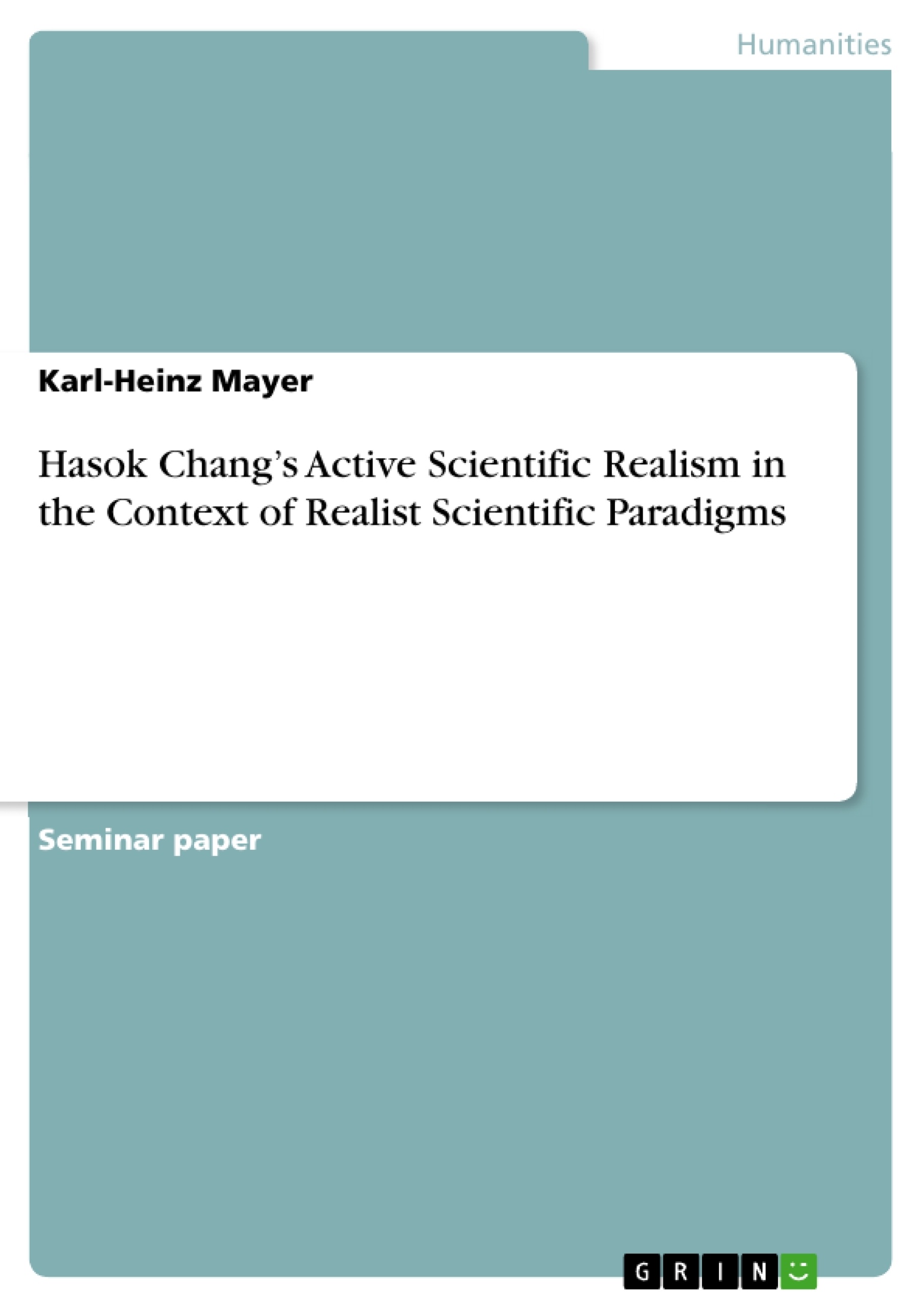In his recent book, Is Water H2O?, Hasok Chang presents a detailed analysis of scientific
realism and enunciates a new concept of it, which he names “active scientific realism”. It is a
view of scientific realism that accentuates experimental activity for learning about reality
rather than armchair philosophy in the search for utmost metaphysical truth. Chang puts it
in a nutshell as follows: “If the buzzword for standard realism is truth, it is progress for active
realism.” (Chang 2012, 223)
This term paper attempts to critically look at this new concept, put it in the perspective of
other realist concepts and find answers to questions like the following:
• How does Chang’s concept fit into the existing landscape of scientific realism?
• What are the roots of the concept?
• What is new and attractive in it?
• What are the weaknesses of the concept?
First I’ll try to define scientific realism as a metaphysical and epistemological position as
opposed to anti-realism. In the next chapter I’ll present the main arguments for and against
scientific realism, the “no miracle” argument and the “pessimistic meta induction”, and also
look at them from Hasok Chang’s angle of view.
Then a brief overview of common realist positions in philosophy of science will be given,
including Hasok Chang’s new conception. In the following chapter I’ll try to look critically at
some aspects of Chang’s “Active Scientific Realism” and balance the strengths and
weaknesses of the concept.
Inhaltsverzeichnis (Table of Contents)
- Introduction
- Definition of Scientific Realism
- Arguments pro and contra Scientific Realism
- The "no miracle” argument
- The “pessimistic meta-induction”
- The Bandwidth of Scientific Realism
- Standard Scientific Realism
- Conjectural Scientific Realism (Karl Popper)
- Structural Scientific Realism (John Worrall)
- Experimental Scientific Realism (Ian Hacking)
- Active Scientific Realism (Hasok Chang)
- Summary: Flavors of Scientific Realism
- Critique of Chang's Active Scientific Realism
- Methodological or Epistemological Concept?
- Chang versus Hacking
- Humility or Confidence?
- Conclusion
Zielsetzung und Themenschwerpunkte (Objectives and Key Themes)
This term paper aims to critically analyze Hasok Chang's concept of "active scientific realism" as presented in his book "Is Water H₂O?". The paper will explore how this concept fits within the existing landscape of scientific realism, delve into its origins, and examine its strengths and weaknesses. Key themes of the paper include:- Defining scientific realism as a philosophical position opposed to anti-realism
- Analyzing the main arguments for and against scientific realism, particularly the "no miracle" argument and the "pessimistic meta-induction"
- Presenting an overview of common realist positions in the philosophy of science, including Chang's "Active Scientific Realism"
- Critically examining various aspects of Chang's "Active Scientific Realism" and balancing its strengths and weaknesses
Zusammenfassung der Kapitel (Chapter Summaries)
- Introduction: This chapter introduces the subject of Hasok Chang's "active scientific realism" and outlines the paper's key questions and objectives.
- Definition of Scientific Realism: This chapter defines scientific realism as a philosophical position asserting that scientific theories accurately depict the external world. It contrasts this with anti-realism, which views scientific theories as mere tools for prediction. The chapter also discusses various aspects of scientific realism, such as representation, truth, and the role of experimentation.
- Arguments pro and contra Scientific Realism: This chapter examines two main arguments for and against scientific realism: the "no miracle" argument and the "pessimistic meta-induction." It critically analyzes both arguments and considers Hasok Chang's perspective on them.
- The Bandwidth of Scientific Realism: This chapter provides a brief overview of different forms of scientific realism, including Standard Scientific Realism, Conjectural Scientific Realism, Structural Scientific Realism, Experimental Scientific Realism, and Active Scientific Realism.
- Critique of Chang's Active Scientific Realism: This chapter delves into a critical analysis of Chang's "Active Scientific Realism," exploring its methodological and epistemological implications, comparing it to Ian Hacking's perspective, and discussing its balance between humility and confidence.
Schlüsselwörter (Keywords)
This paper focuses on the philosophical concept of scientific realism, particularly exploring the concept of "active scientific realism" developed by Hasok Chang. Key terms and themes include scientific realism, anti-realism, instrumentalism, the "no miracle" argument, the "pessimistic meta-induction," experimental activity, truth, progress, and the relationship between science, technology, and engineering.- Quote paper
- Dkfm., BA Karl-Heinz Mayer (Author), 2013, Hasok Chang’s Active Scientific Realism in the Context of Realist Scientific Paradigms, Munich, GRIN Verlag, https://www.grin.com/document/273350




